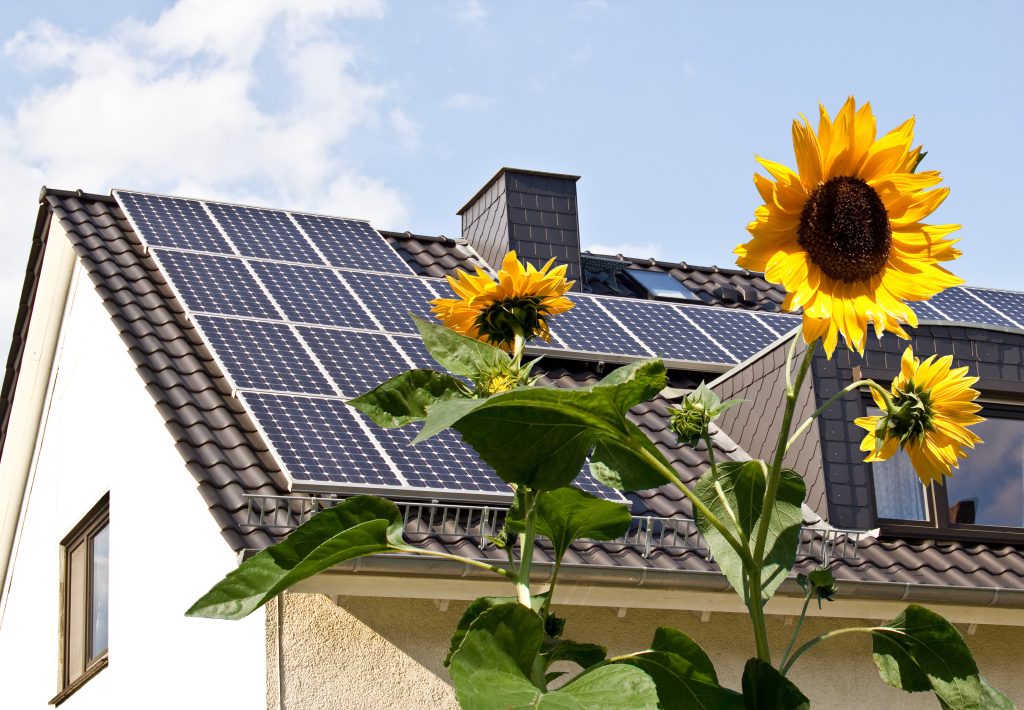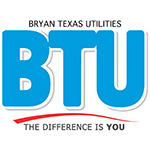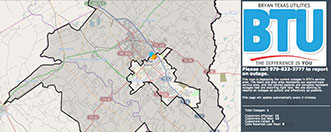Solar

Customers wishing to install solar panels on their home or business should email solar@btutilities.com or call 979-821-5830 to speak with a member of our staff regarding the required Distributed Generation (DG) Agreement, net metering policy, and technical requirements for connection to the BTU system. Customers are required to have a signed agreement with BTU prior to the installation of panels.
Please email all solar installation plans/drawings and signed DG agreements to solar@btutilities.com.
New Transmission Interconnection
Entities seeking to interconnect to BTU’s Transmission System should contact BTU at 979-821-5830 to request the interconnection requirements. These requirements address the interconnection of Generation, Transmission, and End-User facilities.
Installation Process
Frequently Asked Questions About Solar
Does BTU offer any incentives or rebates for solar?
There are currently no incentives or rebates for solar through BTU.
Can BTU recommend a solar installer?
BTU does not recommend any particular installer and we do not partner in any way with any solar installer. We do recommend our customers compare several different installers and determine all costs before deciding whether solar is right for you.
Is there a limit on how large of a system I can install?
Customers are allowed to install a system at the size of their own choosing. Any customer wishing to install a system over 50 kW will need to contact BTU for the requirements and metering information.
Will my solar system provide energy to my home during a power outage?
Unless the system has a battery backup, the solar system will NOT provide energy during a power outage. U.S. solar photovoltaic (PV) systems are designed to shut off when grid power is out as a safety feature to keep electricity from back‐feeding onto the grid, which can pose danger to utility line personnel.
Are there requirements for how my solar system is designed?
Yes, BTU has a one line diagram that shows how a solar system needs to be installed in order to interconnect to our electric system. BTU also requires that the solar design be approved by our engineering staff prior to installation. For a copy of the one line diagram, and to submit your plans for approval, email solar@btutilities.com.
What is net metering?
Net metering provides credit to the account holder when solar energy is produced and put back onto the BTU grid. During the day, many solar PV systems will produce more energy than the home uses. This excess energy is measured at the utility meter and flows onto the BTU grid. At night or other times when the home uses more energy than the solar PV system can produce, electricity will flow from the grid to the house. At the end of every billing cycle, the credit kilowatt‐hours (kWh) are deducted from the amount of energy consumed from BTU on a one‐for‐one basis.
What if I produce more power than I use in a billing period?
If the solar PV system happens to produce more energy than was drawn from the BTU grid during the billing period, BTU purchases the excess power at the wholesale value, which is based on the current fuel rate of approximately $0.03/kWh. This credit is applied to any remaining parts of the bill (i.e., customer charges, water, wastewater, solid waste, etc.). If the customer has a remaining credit after the total bill is paid, it becomes an account credit. Most customers choose to maintain this credit to make up for times of high usage, however customers can request a check be cut to them twice per year if their credit balance is $150.00 or more.
My solar PV system says it produced xxxx kWh this period, but my BTU bill only shows a
credit for xxx kWh. Why is there a difference?
The BTU meter only measures the amount of electricity put onto the BTU grid, not the total amount produced by your solar PV system. The electricity produced by your system flows directly into the home for immediate use. If the home uses less than the amount produced by the solar PV system, then only the excess electricity flowing back onto the grid is measured as a credit.
Why doesn’t BTU pay the retail rate for excess generation?
BTU is a not-for-profit utility and has cost of service based rates, meaning the rates are designed to cover the utility’s cost to serve customers. BTU’s rate for kWh includes expenses beyond the price of energy, such as operational costs of the utility and transmission costs. To ensure that a fair price is being paid to solar customers, without becoming an expense to other non-solar customers, BTU does not pay back at the retail rate.
Are there any fees associated with installing solar in the BTU service territory?
An inspection of your solar installation by BTU is required prior to interconnection with the BTU electrical distribution system. The fee for this inspection is $240, which covers the cost incurred by BTU. Any additional inspections that may be required to approve needed corrections to the installation are also billed to the customer at a rate of $240. BTU is not responsible for issuing any construction permits for your installation; customers should work with their installer or local government for information on required permits.
How long will it take to get my return on investment?
That depends on your usage, rates, federal or state tax incentives and the cost of the system, including any interest accrued. It is advised to calculate all of these factors to determine your return on investment.
I just purchased a home that has an existing solar system. What do I need to do to begin producing solar power?
BTU must have a signed Distributed Generation (DG) agreement with the new account holder before we can tie the system back into the BTU grid. Contact our Energy Management Department at 979‐821‐5715 or solar@btutilities.com for more information.





